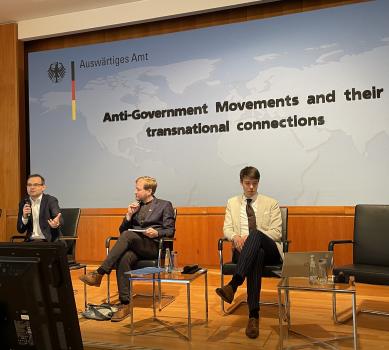Anti-Government Extremism (AGE) presents a complex and evolving security challenge, particularly in the transatlantic space. AGE is characterised by anti-system sentiments, and adherents propagate notions of an evil elite controlling societal mechanisms, adapting global conspiracy theories to local grievances. While predominantly non-violent, it harbours the potential for violence, posing a significant policy challenge.
This project aimed provide the first comprehensive assessment of anti-government threats in the transatlantic space.
Focusing on Germany, Austria, Sweden, the US, and the Netherlands, ICCT experts made a collected original data to from interviews and online spaces to make a comparative analysis of existing anti-government groups and individuals and their interactions within these countries and beyond, offline and online. The report is available here. Ultimately, the project offered recommendations for counter-terrorism (CT) and prevention and counter-violent extremism (P/CVE) services, at the national and international level.
This project was funded by the German Federal Foreign Office.
Highlights
About the project
The goal of this research was to assist CT and P/CVE services, especially the German Federal Foreign Office (FFO) staff as well as other German security agencies, in better identifying and tackling anti-governmental threats at the national and international level.
Drawing on open-source research, exploration of AGE spaces online, and interviews with national practitioners and policymakers, ICCT produced a cutting-edge comparative report on anti-governmental threats at the national and international level.
Sprecifically, through thematic comparative analysis, it unveils the nature of anti-government groups and individuals, elucidating their transnational linkages both online and offline. By shedding new light on AGE’s manifestations, severity, and responses across jurisdictions, this research illuminates whether AGE constitutes a standalone security concern. Furthermore, it offers insights into practical strategies for addressing AGE, especially in the context of existing policies for preventing and countering violent extremism (P/CVE). The recommendations provided are tailored to the differing characteristics of AGE groups, individuals, and networks, ensuring a nuanced and effective response to this emerging threat, both online and offline.
ICCT organised a closed-door workshop with key figures from German national security architecture to present and validate the preliminary findings of this study. The report is publicly available in English and will shortly be available in German, to disseminate its insights widely. Moreover, ICCT experts shared policy recommendations directly with German stakeholders, delivering targeted and concrete policy support.
As such, this project has produced first-of-kind research that will raise awareness, increase knowledge, provide avenues to the improvement of the capacity of policymakers to respond to the threat of anti-government extremism.








